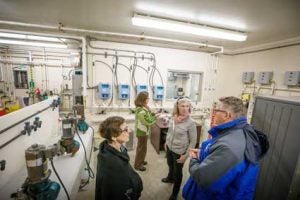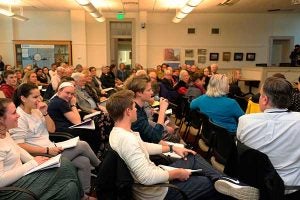![]()
Community Engagement
Co-leads: Emily Diamond, URI Communications/Marine Affairs; Laurel Schaider, Silent Spring Institute (SSI)
The Community Engagement Core (CEC) addresses community concerns about per- and polyfluoro- alkyl substances (PFAS), with a goal of developing intervention strategies to reduce exposures and prevent adverse health outcomes. CEC activities center on Cape Cod, MA, where the sole source aquifer, which provides drinking water to 200,000 year-round and 500,000 summer residents, has been contaminated by aqueous film forming foam (AFFF) use at a municipal fire training academy, military base, airport, and other locations.
Initial findings from private well studies conducted at the Center suggest domestic wastewater entering groundwater from septic systems also can be a source of PFAS to private wells on Cape Cod. While public and private drinking water wells with PFAS levels above health guidelines are now being treated for PFAS, environmental exposures may remain elevated from consumption of locally grown produce in areas with historical drinking water contamination and consumption of fish and shellfish in areas with contaminated surface waters.
The CEC works to strengthen and extend existing bidirectional connections throughout Cape Cod to address local concerns, increase public awareness, and develop intervention strategies to reduce PFAS exposures. The CEC engages with town and county health officials, water suppliers, environmental NGOs, and residents. Bidirectional approaches include holding focus groups with target communities, hosting STEEP community update events, participating in community events throughout Cape Cod, and serving as a resource to inform decision making processes.
The CEC works with the Administrative Core on research translation to develop informational materials and continue to engage with local media to reach a broad audience. The CEC also works to extend its partnership with the Mashpee-Wampanoag Tribe to evaluate exposures among tribal members and develop culturally specific risk reduction strategies. STEEP trainees connect with high school teachers to educate students about PFAS and other pollutants and inspire their interest in protecting water quality.
Collectively the CEC has four specific aims:
Aim 1: Address community concerns about PFAS exposures from environmental sources by offering a testing program for homegrown produce and locally caught fish and shellfish and supporting STEEP’s extended exposure assessment in Hyannis.
Aim 2: Collaborate with the Mashpee Wampanoag Tribe to collect fish, shellfish, and well water for PFAS analysis, develop identity-based messaging strategies to communicate PFAS risks with tribal members, and evaluate the effectiveness of various messages and delivery channels to reduce PFAS exposures.
Aim 3: Connect STEEP trainees with high schools on Cape Cod to enhance understanding of PFAS and other water quality issues through supplemental curriculum and Cape-wide high school water quality summits.
Aim 4: Collaborate with community organizations on Cape Cod and more broadly to educate and empower communities affected by PFAS contamination.



